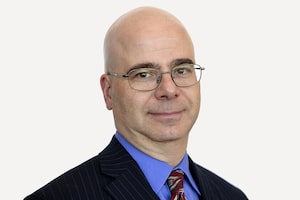Mark Valentine allegedly engaged in several trades that put his own interests first.SUPPLIED/Handout
The Ontario Securities Commission has scheduled an enforcement proceeding against Mark Valentine, who came to prominence in the go-go 1990s by leading brokerage firm Thomson Kernaghan & Co. Ltd. through the tech-stock boom. According to a 2004 OSC settlement agreement, Mr. Valentine tried to arrange a series of loans to rescue the firm, but also engaged in several trades that put his own interests first. The firm collapsed into bankruptcy in 2002.
In August, 2002, Mr. Valentine was one of 50 people arrested by the FBI following a two-year undercover sting operation code-named “Bermuda Short.” In his guilty plea, Mr. Valentine admitted that he agreed to sell US$8-million worth of shares in Softquad Software, a defunct Toronto computer company that traded over the counter on Nasdaq, to an undercover FBI agent.
He also agreed to send 30 per cent of the proceeds of the sale to the agent as a “hidden commission.” Mr. Valentine pleaded guilty to one count of securities fraud in the United States in 2004, was sentenced to four years’ probation and then deported. He returned to Toronto.
The 2004 settlement with the OSC barred Mr. Valentine from ever being a broker in Ontario and prohibited him for life from serving as an officer or director of any “issuer” – an Ontario company that has issued stock. The agreement also included restrictions for 15 years on his ability to trade shares he personally owned.
At the time of the settlement, Kelley McKinnon, the OSC’s chief legal counsel, called Mr. Valentine’s penalties “possibly the most serious sanction the commission has ever meted out on a matter. … Those are the ones that are going to keep him out of the market in the future.” She told The Globe and Mail his conviction in the U.S. and the OSC action would effectively “shut him down” in the U.S. and Canada.
The new OSC allegations unveiled on Wednesday, which have not been tested in court, suggest the 2004 settlement order has failed spectacularly. The OSC says Mr. Valentine failed to resign as a director from two companies – Q Capital Corp. and Wisdom Capital Partners Inc. – he created before the OSC agreement. Since then, according to the OSC, he became a director and/or officer of 36 Ontario companies. None of the 38 companies are “reporting issuers,” which are companies that file prospectuses, trade on an exchange and submit periodic reports to the OSC.
The OSC said Mr. Valentine also engaged in a trade of $1.36-million of stock of a Toronto company, Flyp Technologies Inc. Also, the OSC alleges, two companies he controlled received $4.3-million in compensation from 2015 to 2017 for helping to arrange loans to borrowers who pledged stock as collateral. The OSC cites both arrangements as examples of Mr. Valentine engaging in trading in securities in breach of the trading ban and the commission’s order.
The OSC is asking that Mr. Valentine again be barred from serving as a director or officer and again be subject to a trading ban. In Wednesday’s complaint, the OSC asks Mr. Valentine to repay “any amounts obtained as a result of non-compliance with Ontario securities law.” The OSC is also asking for administrative penalties of “not more than $1-million for each failure to comply with Ontario securities law.”
Janice Wright, Mr. Valentine’s lawyer, said in an email Wednesday “as this matter proceeds there will be serious issues raised in Mr. Valentine’s defence, including legal advice he received and relied on at the time. We will present all of the evidence in due course at the hearing before the Commission. "
The hearing is scheduled for April 21. The OSC declined to comment on the case beyond the documents it released Wednesday.
Mr. Valentine is the son of Canadian diplomat Douglas Valentine, a former ambassador to Saudi Arabia, Colombia and Yemen. He joined Thomson Kernaghan in 1994, just two years into his career, and by 1997 was making so much money trading red-hot Internet stocks that a majority of Thomson Kernaghan’s partners backed his plans to reinvent the company as a specialized technology brokerage and investment banker.
He quickly became chairman and 25-per-cent owner of the firm. Mr. Valentine was able to afford a sprawling home in Toronto’s affluent Forest Hill, a beach house in Florida, a cottage at Lake Simcoe and a Falcon jet to shuttle family and friends.
According to former Thomson Kernaghan officials, his partners were so grateful for their earnings that the firm bought him a Ferrari in 1998 as part of his compensation. The licence plate adorning the sports car read “giddy up,” an echo of Mr. Valentine’s frequent rallying call to his small trading team: “Giddy-up, let’s get going.”
His lawyer in the 2004 OSC case, Edward Greenspan, said at the time the OSC agreement meant Mr. Valentine “can now get on with his life. … He’s a very young man and he’s got a long future ahead of him and I’m sure he’ll be very successful.”
Your time is valuable. Have the Top Business Headlines newsletter conveniently delivered to your inbox in the morning or evening. Sign up today.
 David Milstead
David Milstead